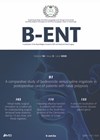
Journal Reviews
Storytelling is good for your memory
Mild cognitive impairment (MCI) presents a challenging frontier in healthcare due to the limited availability of effective drugs. Despite its prevalence and potential progression to dementia, there remains a notable gap in pharmacological interventions targeting MCI. This month’s Editors’ Choice...
Feel what you say: a framework to demonstrate the emotional response to aphasia is intertwined with the emotional toll
The authors start this paper by flagging a recent study demonstrating that speech and language therapists in clinical practice rarely have time to focus on emotional issues in relation to aphasia. Yet, people with aphasia describe the close relationship between...
How much does it cost to simulate speech and language therapy placements?
The Royal College of Speech and Language Therapists report that 20% of speech and language therapy positions are unfilled in the UK. Consequently, there is an urgent need to offer as many training courses as possible to fill these gaps....
Parkinson’s humour: recognising social communication difficulties
Parkinson’s results in a progressive motor disease with symptoms including tremor, rigidity and bradykinesia. However, people with Parkinson’s also experience non-motor symptoms such as cognitive difficulties that can impact social communication, often due to their co-existing speech difficulties, auditory and...
Factors associated with laryngopharyngeal reflux
This Chinese cross-sectional survey across three hospitals and 320 patients looked at the effect of unhealthy lifestyles and eating habits, as well as psychological difficulties, on the development of laryngopharyngeal reflux (LPR). All the participants underwent gastroscopy, laryngoscopy and various...
A song for my future self
People with aphasia experience a loss of friendships and social networks and, with this, a loss of identity. Interventions targeting participation, social and emotional wellbeing for people with aphasia have received more attention in the research literature. Storytelling is a...
A match made in heaven: being a good supervisor
Supervision is a core component of clinical training for all healthcare professionals. Most colleges advocate supervisors be trained in the skill of supervision, but this is not standard practice. Often supervisors rely on the skills they learn from their own...
Therapeutic alliance: more than the ‘nice person’ effect
Therapeutic relationship is considered a key component of many healthcare interventions, including speech and language therapy. Yet definitions and descriptions of what this concept comprises are ambiguous and sparse. This scoping review used the Joanna Briggs Institute guidelines to guide...
Motor learning: better knowing how, not how well
Motor learning is described as the ability to perform a motor skill due to practice and/or experience. Research on interventions to enhance limb motor skills can be influenced through the amount, distribution, variability and schedule of practice as well as...
I saw it on the internet: gathering evidence for clinical decision making
Evidence-based practice is often described as the integration of three sources of information to inform clinical practice, namely: 1) research evidence/practice guidelines; 2) client preferences/needs, and: 3) clinical experience. Speech and language therapists have reported a lack of time and...
The nice therapist effect: does the therapeutic relationship matter?
Quality of relationships is considered a core component of all speech and language therapy work, yet there is little agreement of what constitutes a therapeutic relationship. This study describes a scoping review to map existing evidence that has investigated this...
Disrupting assumptions: how to teach queer concepts to speech and language therapists
Policy requiring speech and language therapy courses in America to include multicultural content in their courses was only formally introduced in 1994. Yet sexual orientation was still considered a controversial topic at this time, and it was only in the...













